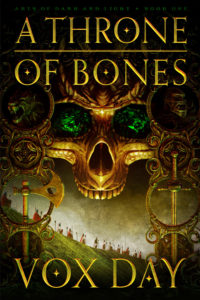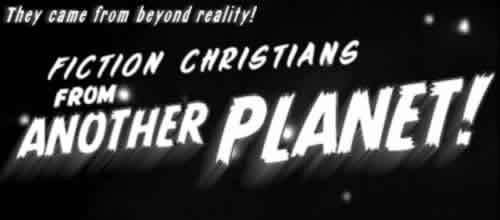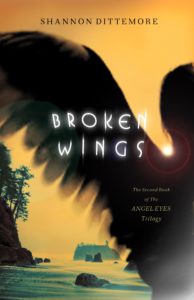 Since our launch in 2008, my small publishing house, Marcher Lord Press , has billed itself as âthe premier publisher of Christian speculative fiction.â We were premier in the sense of âfirst,â and also, I hoped, in the sense that we would remain at the forefront even when other small presses eventually joined our ranks.
Since our launch in 2008, my small publishing house, Marcher Lord Press , has billed itself as âthe premier publisher of Christian speculative fiction.â We were premier in the sense of âfirst,â and also, I hoped, in the sense that we would remain at the forefront even when other small presses eventually joined our ranks.
Our niche is that segment of Christians who love fantasy, science fiction, time travel, superhero, and all the rest of the wonderfully weird genres. We target Christians who love Big Bang Theory, Christians who shop at ThinkGeek.com, and Christians who would go to Comic-CON if given half a chance.
Since 2008, weâve racked up three Christy Award finalist nominations and two wins, something like ten ACFW Carol Award finalist nominations and three straight wins, a number of EPIC and Indie and Inspie nominations and wins, and several positive reviews in Publishers Weekly, Library Journal, and USA Today Online, including a coveted âstarred reviewâ in Publishers Weekly.
One of the advantages of running your own publishing company, especially one that doesnât try to get its wares into brick and mortar bookstores, is that you can publish anything you jolly well please. It used to be that Christian bookstores (and, sometimes, the very conservative patrons of those bookstores) controlled what could and couldnât be published by Christian publishers. One complaint from these folks, and a book could die. Multiple complaints, and there was big trouble. But with a small press selling online, this is not an issue.
Thatâs both good and bad. The good is that you can publish any book you want to publish. The bad is that…you can publish any book you want to publish. It used to be that those folks at bookstores were drawing the line in the sand about what could and couldnât be published. Now, there is no line. Now itâs up to the individual publisher as to what will be published. The mantle of censorship, so to speak, has now been placed on my shoulders and on the shoulders of any indie publisher.
In late 2011, one of my MLP authors came to me with an idea. He was disappointed with the latest volume in George R. R. Martinâs hugely popular secular epic fantasy series that began with Game of Thrones. My author wanted to produce âthe Christian answer to Martin.â He wanted to write an epic not only in scope but in actual sizeâhe wanted a book as big as Martinâs. A typical novel runs around 100,000 words. A typical MLP novel runs around 125,000 words. This one was set to be more than 200,000 words (and ended up being even larger, as youâll see).
But the story idea was going to push the boundaries of Christian fiction. It was to be a warfare book, so there would be lots of violent contentâbut that wasnât a problem for me. I often laugh that traditional Christian fiction is allowed to have so much violence. You can have a body count as high as the sky…but you canât say dang or have a couple French kiss. Anyway, I wasnât bothered by the prospect of violence in the book.
What threw me was that the author felt very strongly that the book needed to have vulgarity (which, he informed me, is different from profanity), nudity, and even sex. He had one scene in mind especially, the reunion between a husband and wife when the man comes home from war. He wanted his book to be a corrective to secular fantasy fiction, which almost never shows sexual conduct between married people but seems rather to glorify adultery.
Indeed, much of his novel was imagined as a corrective to secular fantasy. He wanted to show the Christian faith as a positive influence, for instance. He wanted to show Christian clergy as real peopleâsome good, some badâinstead of as the uniformly sinister and corrupt hypocrites that secular fantasy shows them.
In many ways, this epic fantasy was designed to be the fiction equivalent of a Christian standing up in the middle of, say, Comic-CON and saying, âI love all the things you guys love and are doing, but youâre missing the most crucial aspect, the aspect that matters for eternity. Come over to my booth, and Iâll explain what I mean.â It was, in a sense, a work of apologetics (which has nothing to do with apologizing, btw).
So then the decision fell to me. Of course I wanted to create the Christian answer to Martin, not just for the large audience weâd be sure to attract-slash-irritate, but also because of the authorâs noble intent.
But could I publish a book with vulgarity, nudity, and sex? That was the real question. What would my mom think, you know? What would all the awesome homeschooling moms who love MLP think? What would my other authors think? I tell you, this decision drove me to my knees. I spoke to my wife, my advisors, and my stable of authors.
I ultimately felt that God was allowing me to go forward with it, so we did.
In terms of the mature content, about the only thing I changed in editing was to scale back that husband/wife reunion sex scene. The author wrote it out explicitly, leaving it to me to decide where to draw the line. Ack. I scaled it back a couple of times until I could read it without freaking out.
Meanwhile, during the editing of the book, word was getting out that we were heading toward the launch of this book. One woman wrote me to say that we were no longer a Christian company and when I came back to God I could drop her a note and sheâd think about supporting us again. I expected that sort of thing.
What I hadnât expected was the support I received. I had a number of authorsâsome were my own authors and some were folks who had despaired of ever finding a publishing outlet for their mature Christian novelsâprivately tell me how much an answer to prayer this new development was to them.
Things were going along pretty well until two days before the book was to release. I got a note from the folks at a prominent Christian fiction writers group in America saying that if we released this book, they would take MLP off their list of approved publishers. That meant that all MLP books would not be eligible for their annual award.
As much as I believed in this book and its author and our goals, I was not prepared to let one book sabotage the chances of all my other authors receiving an award I think has value.
Oh, the drama. Was I going to cancel the book? Was I going to go through and remove everything this organization found objectionable? Was I going to hurt all my other authors? Was I going to succumb to what some folks said amounted to blackmail? (I didnât think it was blackmail, by the way. I saw it as them adhering to their guidelines.) Remember, this was all happening 36 hours before the book was set to release.
I finally asked the organization if it would change anything if I created a new imprint and released the book under that imprint. They said, âOh, yeah. If you did that, the problem would go away.â
âReally?â sez I. âAll my other books would still be eligible for the award?â
âSure.â
And thus, Marcher Lord Hinterlands was born, a brand new imprint for one book (so far).
 A Throne of Bones by Vox Day released on December 1, 2012. It weighed in at just under 300,000 words and over 850 pages in hardcover. It is currently our overwhelming bestseller both in hardcover and in e-book.
A Throne of Bones by Vox Day released on December 1, 2012. It weighed in at just under 300,000 words and over 850 pages in hardcover. It is currently our overwhelming bestseller both in hardcover and in e-book.
Now Iâm looking to release more titles in the Hinterlands imprint. Iâve got some good prospects, but nothing solid yet, except further books in Dayâs series.
 What came to us like a crisisâthe sudden need to form a separate imprintâhas resulted in nothing but good. Instead of trying to re-imagine all of MLP with this book in it, we can keep these âmatureâ books separate. People had suggested the imprint idea to me previously, but it wasnât until this came up that I was willing to do it.
What came to us like a crisisâthe sudden need to form a separate imprintâhas resulted in nothing but good. Instead of trying to re-imagine all of MLP with this book in it, we can keep these âmatureâ books separate. People had suggested the imprint idea to me previously, but it wasnât until this came up that I was willing to do it.
What does it mean to be a Christian? Does it mean to not smoke, not drink, not cuss, not play cards, not dance, not have tattoos or piercings, not watch R-rated movies, and not do a hundred other things? Does it mean to do certain things, like always tithing and always being in church whenever the doors are open or wearing the right clothes and hairstyles or listening to the right radio stations or voting the right way?
I contend that Christianity is not about the doâs and donâts (including the doâs and donâts of what a Christian publishing company might release) but about what Christ has done for us.
My pastor has been on a journey of discovery of grace these last eight months, and it has been an amazing thing to travel it with him. His most recent sermon talked about how well-meaning Christians like to raise the standards for who can âget inâ to Christianity, but only after theyâre already in. Most of us wouldnât be allowed in if the standards we want to apply to others had been applied to us. But Christ was all about lowering the bar, about welcoming to Him anyone who would come. He didnât even cast away people who came for the wrong reasons.
Does Christianity consist of the thou-shalt-nots we can think of? Or does it consist of loving Him right in the middle of our imperfections and sins and bad habits? Do we have to become purified before He will take us? And after He takes us, do we have to purify ourselves or He wonât keep us?
I know it sounds like Iâm saying that sin doesnât matter. Iâm not. But what Iâm saying is that Christianity is more than rules. Itâs about grace.
Thatâs all been helpful to me as Iâve contemplated Marcher Lord Hinterlands. Yes, itâs an effort to be evangelistic, to get those without Christ to be exposed to the gospel through science fiction and fantasy. But thatâs not all Hinterlands is. Itâs also a desire to publish what I like.
Many Christians need to avoid R-rated movies, but some Christians can watch such movies and not stumble. That doesnât mean anything about who has more or less worth to Christ, because thatâs the same for both. It just means that there are Christians who can handle, and even desire to explore, stories with this sort of content. They can be grittier and, in some senses, more realistic.
I know this is a lightning rod. (Thatâs probably part of why I like it.) Iâm under no illusion that all Christians will approve of what weâre doing here. Thatâs okay, because itâs not before them that Iâll stand in judgment. But Iâve been pleased that Hinterlands is giving encouragement to so many who have heard of it.
I think it might just be touching on a need that some of us, myself included, didnât even know was there waiting to be filled.
– – – – –
 Jeff Gerke trains novelists how to better do what it is theyâre trying to do. He trains through his three books for Writers Digest: Plot Versus Character, The First 50 Pages, and How To Write a Novel in 30 Daysâand What To Do with It Next. He trains through his online video training program called FictionAcademy.com, a part of BestsellerSociety.com. He trains through the many writers conferences he teaches at all over the country every year. And he trains through the freelance editing he does for his clients. Jeff is the founder of Marcher Lord Press, the premier publisher of Christian speculative fiction. He lives in Colorado Springs with his wife and three children. Contact him at www.marcherlordpress.com, www.FictionAcademy.com, www.BestsellerSociety.com, or on the Marcher Lord Press Facebook page.
Jeff Gerke trains novelists how to better do what it is theyâre trying to do. He trains through his three books for Writers Digest: Plot Versus Character, The First 50 Pages, and How To Write a Novel in 30 Daysâand What To Do with It Next. He trains through his online video training program called FictionAcademy.com, a part of BestsellerSociety.com. He trains through the many writers conferences he teaches at all over the country every year. And he trains through the freelance editing he does for his clients. Jeff is the founder of Marcher Lord Press, the premier publisher of Christian speculative fiction. He lives in Colorado Springs with his wife and three children. Contact him at www.marcherlordpress.com, www.FictionAcademy.com, www.BestsellerSociety.com, or on the Marcher Lord Press Facebook page.
 This is one alien belief of the invasive Christian novel-character âChild-Peopleâ I introduced last week: exclusive promotion that is not simply of childlike trust to believe in Christâs own words about Himself, but of blind faith that God exists, loves, and/or saves.
This is one alien belief of the invasive Christian novel-character âChild-Peopleâ I introduced last week: exclusive promotion that is not simply of childlike trust to believe in Christâs own words about Himself, but of blind faith that God exists, loves, and/or saves. I could say this is a Fiction Christian from Another Planet, and stop. We both know I wonât.
I could say this is a Fiction Christian from Another Planet, and stop. We both know I wonât. Letâs say I wrote a novel in which the main character started off as a silly-minded Christian but came to deeper faith â and later, thrilling action-adventures in a perilous overseas mission field â after he got ahold of thick books of well-argued Christian doctrine and systematic theology. Readers would go on red alert. Which doctrines? Which authors? Which (gasp!) church denominations? Too many Christians wish to avoid other doctrines or churches, so few authors or publishers will mention them. âBlind faithâ is an easy out.
Letâs say I wrote a novel in which the main character started off as a silly-minded Christian but came to deeper faith â and later, thrilling action-adventures in a perilous overseas mission field â after he got ahold of thick books of well-argued Christian doctrine and systematic theology. Readers would go on red alert. Which doctrines? Which authors? Which (gasp!) church denominations? Too many Christians wish to avoid other doctrines or churches, so few authors or publishers will mention them. âBlind faithâ is an easy out. 2. Itâs close to an untouchable trope.
2. Itâs close to an untouchable trope.










































 In such novels, I keep wanting to meet and empathize with characters who are, for lack of a better adjective, heroic Christians. A Christian Han Solo or a Christian Captain Jean-Luc Picard. Or for that matter, someone of the robust personality, ambitions, and deep suffering of the Apostle Paul. Someone who despite his faults is committed to Christ and has been for years. Someone to whom I can look up, rather than looking down at or even across to him.
In such novels, I keep wanting to meet and empathize with characters who are, for lack of a better adjective, heroic Christians. A Christian Han Solo or a Christian Captain Jean-Luc Picard. Or for that matter, someone of the robust personality, ambitions, and deep suffering of the Apostle Paul. Someone who despite his faults is committed to Christ and has been for years. Someone to whom I can look up, rather than looking down at or even across to him.















